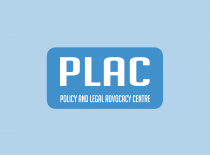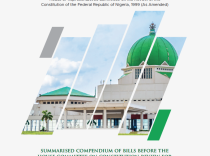President Muhammadu Buhari has formally presented the 2018 budget proposal of N8.612trillion at a joint session of the National Assembly on Tuesday 7, November 2017 .
It would be recalled that President Muhammadu Buhari had written to the National Assembly in a letter dated 1 November 2017 informing them of his intentions to present the 2018 budget proposal on Tuesday, 7 November 2017.
The 2018 budget proposal of N 8,612,236,953,214 comprises of:
- Statutory transfers – N456, 458, 654,074 billion;
- Debt service – N2, 233, 835, 365,699 trillion;
- Sinking fund – N220 billion to retire certain maturing bonds;
- Non-debt recurrent expenditure – N2, 427, 665,113, 222 trillion; and
- Capital expenditure – 427, 665,113, 222 trillion
The 2018 budget proposal is also premised on the following assumptions:
- Oil benchmark price $45 per barrel
- Oil production: 3 mbpd
- Exchange rate N305/$1
- Inflation Rate: 4%
- Oil Revenue: 44 trn
- Non-Oil Revenue and Other Sources –165 trillion
The ceremony was presided over by Senate President Bukola Saraki (APC:Kwara) and his counterpart in the House of Representatives, Rt. Hon. Yakubu Dogara (APC:Bauchi), who gave the closing remarks ad vote of thanks. Other lawmakers, key members of the Executive including the Vice President Yemi Osibanjo; service chiefs; heads of Ministries; Departments and Agencies; leaders of political parties and the Clerk of the National Assembly, Mr Ataba-Sani Omolori were also in attendance.
Giving the welcome remarks, the Senate President Bukola Saraki commended the efforts of the President, his economic management team and lawmakers for prioritizing the passage of some economic reform bills that helped the country out of economic recession. The President‘s commitment in presenting the budget earlier than December was also lauded as a “welcome development”.
However, Sen. Saraki urged the President to address leakages, strengthen independent revenue collection from state owned enterprises and review some of the agreements that the government had signed with some private sector service providers, as many were not in the interest of the country. He also suggested that the President could build on strengthening on the budget process by submitting the budgets of parastatals and agencies at the same time with the National budget, as provided for in the constitution as well as implementing the Procurement Act and ensuring that the budget is accompanied with a finance bill. According to the Senate President, a finance bill would help ensure consistency in the government’s economic programs and tax policies.
Furthermore, he called on the Government to take deliberate steps in making the 2018 budget a job oriented one and for the full implementation of the 2017 budget. Afterwards, the Senate President invited the President to deliver his budget speech and lay the 2018 budget proposal for National Assembly’s consideration.
In his budget speech, the President stated that it had been termed “The BUDGET OF CONSOLIDATION”, as it sought to consolidate on the achievements of previous budgets and deliver on Nigeria’s Economic Recovery and Growth Plan (ERGP).
His speech highlighted the following:
Overview of Economic Developments in 2017
The President stated that 2017 was a year of uncertainty with key global developments impacting Nigeria’s economic fortunes n one way or the other. However, he assured Nigeria that 2018 was expected to be a year of better outcomes with the International Monetary Fund (IMF) anticipating a global GDP growth rate of 3.7 percent in 2018. He also credited Nigeria’s crop production which rose to 45 percent in the second quarter of the year, the significant progress made in the Solid Minerals Development Sector and Nigeria’s exemption from the outputs costs imposed on OPEC members in January 2017 as significantly contributing towards helping Nigeria come out from its most challenging time. Significantly, the President stressed that his administration was able to invest an unprecedented sum of N1.2 trillion in capital projects-the highest ever in the history of the country and injected $500 million to the Sovereign Wealth Fund. He also credited the new ease of doing business rating of Nigeria by the World Bank, improved tax administration, optimized efficiency in expenditure , increased investment in infrastructure such as the Abuja Metro-Rail Project which is 98% completed and the tremendous successes in the Federal Government’s Social Investment Programme as some notable achievements in 2017.
Performance of the 2017 Budget
The President recalled that the 2017 Budget of “Recovery and Growth” was based on an oil benchmark of $44.5 per barrel, oil production of 2.2 million barrels per day and a Naira to US Dollar Exchange rate of 305. Based on these assumptions, total revenue of 5.084 trillion naira was projected to fund aggregate budget of N7.4441 trillion naira while a projected fiscal deficit of 2.356 trillion naira was to be financed by domestic and external borrowings.
However, speaking on actual revenue performance , the President stated that collections were 14% below target as of September 2017 due to the shortfall of oil revenues. He stated that key revenue shortfalls were from independent revenues as only N155.14 billion was remitted in September, 2017 as against the projected pro-rated sum of N605.87 billion naira. This represents a 74% shortfall. To address this issue, the President stated that he had directed the Economic Management Team (EMT) to review the fiscal profile of these agencies to ensure their strict compliance with applicable Executive Orders and Financial Regulations. He also stated that the Fiscal Responsibility Act would likely undergo further review to bring it in line with the said objectives before calling on Nigerians in the meantime to use the Whistle blower lines to complement government’s efforts in this regard.
Proposed Expenditure from the 2018 Budget
Elucidating on the proposed 2018 budget, President Buhari stated that the N8,612,236,953,214 was a nominal increase from the 2017 budget. However, he stated that the deficit would be financed by new borrowings estimated at N1.669 trillion, 50 percent of which would be sourced externally. The balance of the deficit of 306 billion naira is to be financed from proceeds of privatization of some non-oil assets by the Bureau of Public Enterprises (BPE).
He also spoke on his administration’s close assessment of Nigeria’s debt to revenue ratio stating that its medium strategy was to reduce the proportion of domestic debt to 60% by the end of 2019 and increase external debt to 40%. He noted that an advantage of rebalancing the debt portfolio was that it would enhance private sector access to domestic credit.
Other major highlights from the proposed budget include that personnel costs and overhead costs are expected to increase. The President also stated that many capital projects had been provided in the 2018 budget to consolidate on 2017 Budget implementation.
Key capital spending allocations in the 2018 budget include:
- Power, Works and Housing: N88 billion;
- Transportation: N10 billion;
- Special Intervention Programmes: N00 billion;
- Defence: N00 billion;
- Agriculture and Rural Development N98 billion;
- Water Resources: N11 billion;
- Industry, Trade and Investment: N92 billion;
- Interior: N26 billion;
- Education N73 billion;
- Universal Basic Education Commission: N06 billion;
- Health: N11 billion;
- Federal Capital Territory: N30 billion;
- Zonal Intervention Projects N100 billion;
- North East Intervention Fund N45 billion;
- Niger Delta Ministry: N89 billion; and
- Niger Delta Development Commission: N20 billion.
The President also identified key projects such as the Mambilla hydro-power project, the 2nd Niger Bridge and the National Housing scheme as some of the programmes that his administration was determined to implement in 2018.
Lastly, he called on the National Assembly to swiftly consider and pass the 2018 Appropriation Bill to consolidate on the successes that drove Nigeria’s economic turnaround.
Following the President’s budget address, the Speaker Hon. Yakubu Dogara gave the vote of thanks where he thanked the President for fulfilling his constitutional mandate timeously. He also hoped that the Executive’s failure to properly carry out consultations between MDAs and various over- sighting Committees of the National Assembly would not affect the timely passage of the 2018 budget. However, with the President’s presentation of the budget, the bulk now falls on the National Assembly to expedite its consideration and passage.
Click here to read the President’s speech at the Presentation of the 2018 budget





